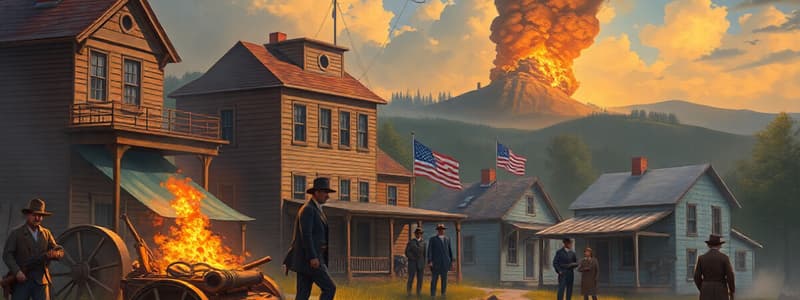Podcast
Questions and Answers
What was a primary economic effect in the South following the Civil War?
What was a primary economic effect in the South following the Civil War?
- Increase in plantation economies
- Rapid industrialization comparable to the North
- Transformation from plantation-based agriculture (correct)
- Surge in wealth among formerly enslaved individuals
Which of the following accurately describes the social situation of African Americans during the Reconstruction era?
Which of the following accurately describes the social situation of African Americans during the Reconstruction era?
- They were universally accepted into social elite positions.
- They sought political participation and education amidst resistance. (correct)
- They faced no significant challenges in education.
- They quickly achieved social equalities comparable to White citizens.
Which factor contributed to social mobility in the post-Civil War era?
Which factor contributed to social mobility in the post-Civil War era?
- The immediate abolition of racial restrictions in education
- The establishment of mixed-race schools
- Increased access to education for both Blacks and Whites (correct)
- The elimination of economic disparities between races
What characterized the artistic and literary response in the North after the Civil War?
What characterized the artistic and literary response in the North after the Civil War?
What ongoing issue affected the Reconstruction-era governments' ability to grant rights to African Americans?
What ongoing issue affected the Reconstruction-era governments' ability to grant rights to African Americans?
How did the economic climate affect Americans in the aftermath of the Civil War?
How did the economic climate affect Americans in the aftermath of the Civil War?
What was one significant challenge faced by women during the Reconstruction era?
What was one significant challenge faced by women during the Reconstruction era?
Which statement best describes the impact of immigration in the North during the Reconstruction era?
Which statement best describes the impact of immigration in the North during the Reconstruction era?
Flashcards
Post-Civil War Economic Changes
Post-Civil War Economic Changes
The Civil War fundamentally altered economic systems in all parts of the country. The South, with its shattered plantation economy and freed slaves, faced huge transitions. The North saw rapid industrial growth and urbanization driven by war-time demand.
Southern Economic Disruption
Southern Economic Disruption
The South's post-war economy was in shambles. The plantation system collapsed, and the labor force was reshaped by the end of slavery. Farmers struggled in debt-based systems.
Reconstruction Era Social Dynamics
Reconstruction Era Social Dynamics
Societal changes were substantial, especially regarding former slaves who sought education, family reunification, and political participation. Racial tensions and violence, however, remained a serious issue in the South.
Rise of Sharecropping
Rise of Sharecropping
Signup and view all the flashcards
Post-War Cultural Shifts
Post-War Cultural Shifts
Signup and view all the flashcards
Importance of Education
Importance of Education
Signup and view all the flashcards
Northern Industrial Growth
Northern Industrial Growth
Signup and view all the flashcards
Reconstruction-era racial tensions
Reconstruction-era racial tensions
Signup and view all the flashcards
Study Notes
Daily Life After the Civil War
- Daily life for all Americans was fundamentally altered by the Civil War and the subsequent Reconstruction era. The war's devastation impacted every facet of society, from the economy and infrastructure to social norms and cultural expression.
After the war, the South experienced significant economic disruption as plantation economies collapsed and labor systems transformed due to emancipation. Many formerly enslaved people became sharecroppers or tenant farmers, facing persistent debt and poverty. Industrialization progressed slowly in the South compared to the North, which enjoyed rapid growth and urbanization, leading to economic disparities and uncertainty.
The emancipation of enslaved people resulted in societal changes, with African Americans pursuing education, family reunification, and political rights amid persistent racial tensions in the South. Reconstruction governments faced resistance while women's roles shifted, yet inequalities persisted. Immigrants arriving mainly in the North enriched the workforce and cultural interactions, with social mobility differing by race, gender, and economics.
Cultural Shifts
The war and Reconstruction era caused major cultural shifts in the North and South. The North experienced a boost in artistic and literary output, while the South's culture was altered by the loss of its pre-war social structure. Education became crucial for upward mobility for both Blacks and Whites, despite ongoing racial segregation. Literature and art mirrored the changing social and political landscapes. The nation transitioned from a rural agrarian society to urban industrial centers, fostering new popular culture and leisure activities. African Americans' experiences, from freedom to the struggle for equal rights, were central in reflecting this evolving culture.
Studying That Suits You
Use AI to generate personalized quizzes and flashcards to suit your learning preferences.




